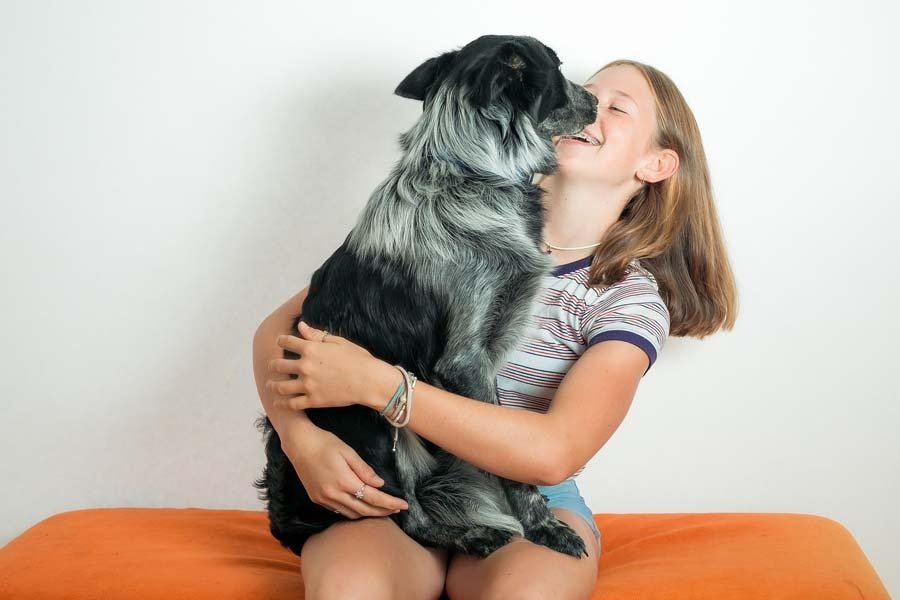A Turramurra Pet Care Article
Can my Pet Get Coronavirus?

Can my Pet Get Coronavirus?
by Dr Gretta Howard, Senior Veterinarian
Pets are affected by certain coronaviruses such as Feline Infectious Peritonitis (FIP) and Canine Coronavirus Disease (CCoD) but these are different to SARS-CoV-2, the cause of the COVID-19 pandemic in humans. Should we be concerned about exposing our pets to a COVID positive human? Can humans catch COVID-19 from pets?
Pets and COVID-19
Can a household pet catch COVID-19 from a human?
Firstly, it is important to know the difference between PCR positive to SARS-CoV-2 (severe acute respiratory syndrome coronavirus-2) and the illness that can develop from this virus, known as COVID-19 (as it was first detected in Wuhan, China in 2019). People and pets can be positive on a PCR test but asymptomatic, which means that do not have COVID-19 (clinical signs of illness), but are asymptomatic carriers of SARS-CoV-2. So, both people and animals can be PCR positive without having COVID-19.
There have been cases where a person who has COVID-19 has passed the virus onto a household pet. Cats seem to be more prone than dogs to acquiring the disease, but pets are either asymptomatic carriers, or the clinical signs are so mild that treatment is not required. This is because the virus has adapted to be more suited to a human host compared with a pet host, so the virus cannot do as much damage in other species.
In Hong Kong during March 2020, a dog that was living with a COVID-19 positive person became PCR positive to SARS-CoV-2 without developing clinical signs. This was detected during a screening process to determine more about the disease in household pets. The Hong Kong SAR Agriculture, Fisheries and Conservation Department (AFCD) reported that the dog tested “weakly positive” to SARS-CoV-2. The Hong Kong authorities believe this finding may indicate the dog has a low-level of infection.
Interestingly, approximately 60% of cats from households with infected owners develop antibodies to SARS-CoV-2, known as seroconversion. A much lower percentage of cats actually develop clinical signs of COVID-19 but the cats seem to develop antibodies at the time the owners were sick.
Should your pet develop an unexplained illness while a member of your household has COVID-19, please let us know. It’s important to explain that your pet has been in contact with someone who has COVID-19 as a contactless or telehealth consultation may be required as a precaution.
Besides humans, which species has COVID-19 been detected in?
World-wide studies have detected SARS-CoV-2 in other species including:
- Cats (including big cats such as lions and tigers in zoos)
- Ferrets
- Mink
- Dogs (rarely)
- Gorillas
- Otters
One study has shown that infected cats can spread the disease to other cats, but this is not the case in dogs. Currently, there are no reported cases of cats (or dogs or ferrets or tigers) transmitting the virus to humans.
As of February 2022, birds and reptiles have not been infected with SARS-CoV-2.
Animals infected with this virus may or may not get sick. Of the animals that have gotten sick, most reported cases were overseas (not in Australia) and the majority only had mild illness and fully recovered. Serious illness in pets is extremely rare, particularly with the Omicron variant, which is currently the dominant variant in Australia.
Pets sick with the virus that causes COVID-19 may have:
- Fever
- Coughing
- Difficulty breathing
- Lethargy
- Sneezing
- Runny nose
- Eye discharge
- Vomiting
- Diarrhoea
Remember that if your pet develops any of these clinical signs, it is far more likely to be caused by another more common disease and not COVID-19. These are very non-specific clinical signs which can be caused by anything from heart failure to conjunctivitis, so never assume it will resolve on its own.
Further research is required to determine more about whether there are any underlying factors that lead to infection of this predominantly human disease in animals.
Can humans catch COVID-19 from their pet?
At this stage there is no evidence that pets can play a role in the spread of this human disease and there have been no cases where a human has caught the virus from their pet. The virus is being spread from human to human and pets appear to be a dead-end host in most cases. However, the virus can spread from humans to animals if the pet is in close contact with an infected person.
As COVID-19 is an ever-evolving situation, it’s recommended to ensure we practise good hygiene when interacting with pets including:
- Wash your hands/use hand sanitiser after touching any animal, particularly before eating
- Avoid sharing food with your pets
- Avoid kissing your pet or letting your pet lick your face or mouth
- Keep your pet’s vaccinations and parasite control up to date and maintain regular veterinary health checks
There have been no reported cases of pets acting as fomites in the spread of COVID-19. This means that an infected person touching the pet is unlikely to pass on the disease to another person who touches the pet. It is generally direct contact with respiratory secretions that transmit the disease. Smooth (non-porous) surfaces (benchtops, door-knobs) transmit viruses better than porous materials (pet fur), because porous materials absorb and trap the virus, making it harder to contract through simple touch.
What is the recommendation for pets if an owner tests positive for COVID-19?
In line with the current advice from the Center for Disease Control (CDC), our recommendation is to keep pets away from humans that have tested positive to COVID-19 as they would for other individuals in the household. If everyone in your household is sick with the virus, then nominate one person to care for the pet and use precautions such as wearing a mask (for you, not your pet!) and exercising good hand hygiene during feeding times and toileting.
Testing pets isn’t necessary because pets who have tested positive generally have mild clinical signs which do not require veterinary intervention. If your pet becomes seriously ill while you are isolating at home with COVID-19, it is more likely that there is another disease process causing the clinical signs, so don’t assume they have the same problem as you. It could be coincidental as the incidence of pets becoming seriously ill with COVID-19 is extremely rare.
Pets that become seriously ill will need a veterinary assessment to determine the cause. If you are sick with COVID-19 and your pet becomes sick, do not take your pet to the veterinary clinic yourself. Call us and let us know you are sick with COVID-19 so we can organise an initial telehealth consultation or wear appropriate PPE to minimise any exposure to our team.
In summary, people with suspected or confirmed COVID-19 should avoid contact with animals, including pets, livestock, and wildlife.
Common coronavirus infections seen in pets
Let’s take a look at the most common coronaviruses seen in cats and dogs.
Feline Infectious Peritonitis (FIP)
Feline infectious peritonitis (FIP) is a serious disease in cats caused by a mutation of the common feline enteric (gut) coronavirus (FeCoV).
The mutation allows the otherwise insignificant virus to enter to escape the gastrointestinal tract lining by entering the gut macrophage cells (an immune system cell) and hitching a ride to other parts of the body, infecting the abdominal cavity, chest cavity, eyes and in some instances, the brain.
Usually, a cat’s immune system prevents clinical FIP but in some cats infected with enteric FeCoV, the immune system fails to eliminate the infection and clinical FIP develops with devastating consequences.
Over 30% of pet cats and over 80% of breeding cats have been exposed to FeCoV (the relatively harmless enteric form).
While the relatively harmless enteric coronavirus (FeCoV) is highly transmissible between cats, the mutated form FIP itself is not contagious to other cats and the feline coronavirus is not the same as the human coronavirus that causes COVID-19.
A previously fatal disease, FIP in cats now has anti-viral treatment options which can save cats’ lives, including remdesivir, which has been used as an anti-viral in severe ICU cases for humans with COVID-19.
For further information about FIP diagnosis and treatment, visit www.turramurravet.com.au/fip.
Canine Coronavirus Disease (CCoD)
Canine Coronavirus Disease (CCoD) is a highly infectious virus that can cause severe diarrhoea in young puppies, causing dehydration and fatigue for several days. Adults usually develop either mild or no clinical signs when exposed to this virus and generally do not need any treatment.
Transmission occurs directly if contaminated faeces is consumed, which is very common given puppies sniff and mouth absolutely everything during the exploration of their environment.
Dogs with severe diarrhoea are sometimes tested using a faecal PCR test to see whether there is an infectious cause. Unless the dog is a very young puppy or immunosuppressed, if the dog is positive for Canine Coronavirus Disease on faecal PCR testing, it is generally considered to be insignificant and not usually the cause of the severe diarrhoea, even if the virus is present.
A vaccination against CCoD is included as part of the Leptospirosis vaccine, which is used in Australia in certain settings where Leptospirosis is a problem, but the Leptospirosis/CCoD vaccine is not considered a core vaccine required for every dog.
At this stage, the recommendation to vaccinate for Leptospirosis/CCoD is based on risk factors which can be found at www.turramurravet.com.au/lepto. It is really Leptospirosis we are concerned about as this can lead to serious consequences, not the Canine Coronavirus Disease, which is usually a short-lived disease causing mild clinical signs in healthy individuals.
References
Centers for Disease Control website: Animals and COVID-19 (updated Jan 22)
Veterinary Partner website: COVID-19 FAQ for Pet Owners (updated Aug 21)
Halfmann PJ, Hatta M, Chiba S, Maemura T, Fan S, Takeda M, Kinoshita N, Hattori SI, Sakai-Tagawa Y, Iwatsuki-Horimoto K, Imai M, Kawaoka Y. Transmission of SARS-CoV-2 in domestic cats (2020). N Engl J Med. 2020 Aug 6;383(6):592-594.
Decaro N, Balboni A, Bertolotti L, Martino PA, Mazzei M, Mira F, Pagnini U, The Board of the Italian Association of Veterinary Infectivologists (2021) SARS-CoV-2 infection in dogs and cats: facts and speculations. Front Vet Sci 2021; 8:619207.


